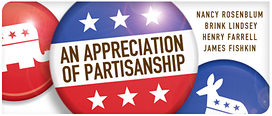Nancy Rosenblum seems to have a view of partisanship that is not very partisan. She criticizes me for connecting partisanship with the desire to win elections and to mobilize voters. If partisans are not interested in those things, and if political parties are not focused on winning a Schumpeterian “competitive struggle for the people’s vote,” then I do not see how they deserve the name. In any case, I applaud the notion that parties might become more deliberative. As Rosenblum knows, we have gotten a major political party, PASOK, one of the two main parties in Greece, to begin the official selection of candidates by employing the Deliberative Poll. And in my Democracy and Deliberation, I decried the decline in deliberation in national party conventions, among other venues, and proposed Deliberative Polling for candidate selection (something we are experimenting with in Greece if not the United States).
I think that parties can sponsor deliberative forums, indeed I have worked on organizing such efforts. But ultimately there is a difference between winning and deliberating. In a world of campaign manipulation and misinformation, I am looking for venues where citizens can be thoughtfully empowered. Those concerned with winning look for strategies focused more strictly on mobilization and persuasion.
There are tradeoffs. Parties that are not concerned with winning will not be influential. But societies without sites for deliberation will have very limited capacities for collective will formation. There are strategic opportunities for getting bits of both, and perhaps that is where Rosenblum and I can agree. In fact deliberation can increase legitimacy on selected issues and can even help public officials politically. But few partisans, recognizable in the present world, are open to accepting this prescription. Maybe Rosenblum and I can jointly persuade a few more, if that is an area of agreement.

